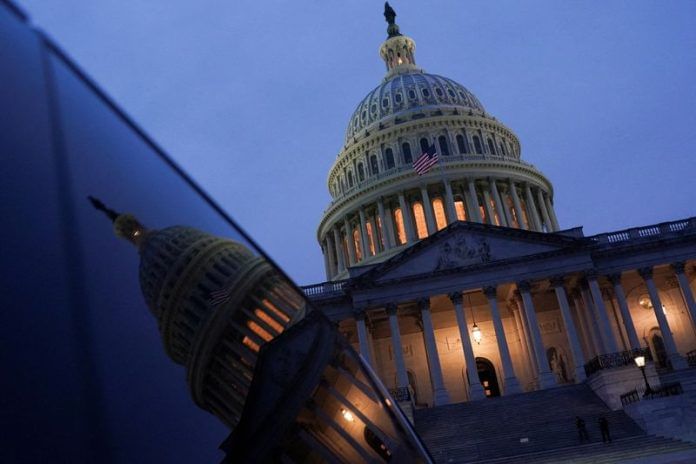By Andy Sullivan, Richard Cowan, David Morgan and Nolan D. McCaskill
WASHINGTON (Reuters) -The U.S. was headed towards its 15th government shutdown since 1981 on Tuesday, with Republicans and Democrats in Congress unable to agree on — indeed not even appearing to negotiate — a deal to fund federal agencies.
The Republican-controlled Senate is expected to vote on a temporary spending bill that has failed once already, with no sign that a second vote will bring success before the midnight deadline (0400 GMT Wednesday).
Democrats want to modify the bill to extend health benefits for millions of Americans that are due to expire at the end of the year. Republicans say they must tackle that issue separately.
“We’ll have plenty of time for all the policy debates,” House of Representatives Speaker Mike Johnson, a Republican, said on CNBC. “But you have to keep the government open to do it.”
Federal agencies, meanwhile, issued detailed plans that would close offices conducting scientific research, customer service, and other activities not deemed essential and send thousands of workers home if Congress does not agree on a fix before funding expires.
SHUTDOWN COULD IMPACT FLIGHTS
Airlines warned that a shutdown could slow flights, while the Labor Department said it would not issue its monthly unemployment report, a closely watched barometer of economic health. The Small Business Administration said it would stop issuing loans, while the Environmental Protection Agency said it would suspend some pollution-cleanup efforts.
Democrats sought to drive a wedge between U.S. President Donald Trump and his Republican allies in Congress, saying the president showed an interest in extending a tax break that lowers health costs for 24 million Americans at a White House meeting on Monday.
Trump himself followed up late Monday by posting a deepfake video showing manipulated images of Democratic Senate Leader Chuck Schumer appearing to criticize Democrats while top House Democrat Hakeem Jeffries stood next to him, with a crudely drawn sombrero and mustache imposed over his face.
Speaking to reporters outside the U.S. Capitol, Jeffries responded to Trump’s post: “The next time you have something to say about me, don’t cop out through a racist and fake AI video. When I’m back in the Oval Office, say it to my face.”
Any last-minute agreement would also have to be approved by the Republican-controlled House, which is not due to convene until Wednesday, after funding expires.
Budget-related showdowns have become a routine feature in Washington as the nation’s politics have grown increasingly dysfunctional, though they are often resolved at the last minute. The government last shut down for 35 days in 2018 and 2019, during Trump’s first term, due to a dispute over immigration.
At issue now is $1.7 trillion that funds agency operations, which amounts to roughly one-quarter of the government’s total $7 trillion budget. Much of the remainder goes to health and retirement programs and interest payments on the growing $37.5 trillion debt.
ADMINISTRATION THREATENS MORE LAYOFFS
Trump’s willingness to ignore spending laws passed by Congress has injected more uncertainty this time around, and he has threatened to extend his purge of the federal workforce if Congress allows the government to shut down.
In the spring, he ordered federal agencies to consider firing “nonessential” employees who normally would be ordered not to work during a shutdown.
“We may do a lot, and that’s only because of the Democrats,” Trump told reporters on Tuesday morning.
Trump has also refused to spend billions of dollars approved by Congress, prompting some Democrats to question why they should vote for any spending legislation at all. Though Republicans control both chambers of Congress, they need at least seven Democratic votes to pass legislation out of the Senate.
Along with the extended health subsidies, Democrats have also sought to ensure that Trump will not be able to undo those changes if they are signed into law.
Locked out of power in Washington, Democrats are under pressure from their frustrated supporters to score a rare victory ahead of the 2026 midterm elections that will determine control of Congress for the final two years of Trump’s term. The healthcare push has given them a chance to unite behind an issue that resonates with voters.
Still, some in the party have questioned whether it is worth risking a shutdown.
“It’s not about politics or who gets blamed for it. It’s about the damage to millions of Americans,” Democratic Senator John Fetterman of Pennsylvania told reporters.
(Reporting by Richard Cowan, Courtney Rozen, David Morgan, Andy Sullivan and Bo Erickson in Washington; Additional reporting by Susan Heavey, Doina Chiacu, Nolan McCaskill and Trevor Hunnicutt; Writing by Andy Sullivan; Editing by Scott Malone, Alison Williams and Alistair Bell)
Disclaimer: This report is auto generated from the Reuters news service. ThePrint holds no responsibility for its content.





